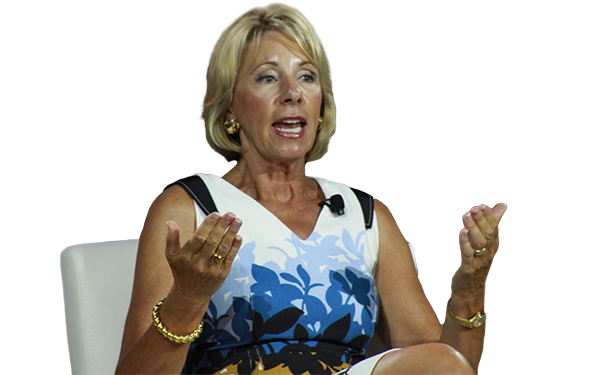The 74’s Lizzie Thompson interviewed Betsy DeVos back in August 2015 — 15 months before Donald Trump tapped her to become his education secretary — about school-choice issues and how she saw education possibly affecting the 2016 presidential race. The interview has been lightly edited for clarity. (Disclosure: The Dick & Betsy DeVos Family Foundation is a supporter of The 74 and sponsored our 2015 New Hampshire Education Summit.)
The 74: How did school choice become a passionate cause for you? Was there a particular moment, or did it gradually develop over time?
Betsy DeVos: After my husband, Dick, and I had our four children and began thinking about school for them, we both realized that the opportunities we had to choose the best educational setting for them were very broad. We could afford to make those decisions and choices. At the same time, we became introduced to a small, urban, Christian school in our city that served a very different population than where our kids were growing up. We became involved in helping scholarship kids in that school. And as we became more and more involved in that school, our passion grew for changing policy more broadly, to allow other kids to have access to the opportunities our kids had.
It’s been probably close to 30 years now since we started to get involved. And we really realized that ultimately public policy has to change in order for those options and those opportunities to become available to a broad cross section of people who today don’t have them.
You mentioned in a previous interview that you’ve seen a growing number of Democrats interested in the school-choice issue, more than ever before. Why is that shift happening in the movement toward school choice, and how do you expect that dynamic to play out in 2016?
We have seen more and more Democrats elected to state legislatures embrace [school choice] because the reality is that most if not all of them know in their heart of hearts that this is the right thing for their constituents. Yet many of them have been afraid to cast the votes needed to make these policy changes. And so we can come alongside them and, first of all, help them understand how changes in policies can help unleash and tap into new potential, for empowering parents and children. And we can also demonstrate to them that it can be safe politically for them to support these ideas, and that their constituents are ultimately the ones who are going to benefit. More broadly, their state and our nation will benefit as more and more kids have the opportunity to develop their fullest potential.
The 74 is founded and run by two women, and you lead the American Federation for Children (on whose board 74 co-founder Campbell Brown sits). There are a lot of women and mothers in the school-choice and education-reform movements. Why do you think there are so many mothers and women leading the charge?
I haven’t thought of it that way before. I would posit that mothers in general tend to be more intimately involved in their own children’s education. And I know that’s a generalization, because there are many fathers as well, but I think we [women] just see the power of a quality, challenging education and the potential that it unleashes. I think in general, we want the best not only for our own children but every child we encounter, and want to see them develop into the most amazing and fruitful person that they can possibly be.
I am so excited that the AFC can work with The 74 and Campbell [Brown] and Romy [Drucker], because there is no more pressing domestic issue facing our country than the future of educational opportunity for every child. To be involved in this way, to help bring to the forefront this issue, particularly as we look ahead to another national election, it’s exciting to be partnered with The 74 and bring the conversation to a whole new level.
What is it about our 2015 Education Summits that made you want to get involved with them as a sponsor?
The opportunity to really bring the conversation to a new level. The conversation around education, and the need for empowering parents and kids to make the right choices for them, has continued to gain momentum the last few years. This has been an ongoing conversation. When I look back, it was almost 50 years ago that Milton Friedman introduced the idea of education choice through vouchers. The conversation around [school choice] and the efforts around it have really been building for a number of decades. But in the last four years we’ve seen actual choice take off in a significant way, with 48 programs in 23 states and Washington, D.C. And it’s moved politically from being a really difficult, supercharged issue politically to more broadly a social-justice issue that is impacting thousands and thousands of lives.
So the prospect of being able to take this whole conversation to another level in the confines of a national election is really exciting for us. There is no more pressing domestic issue that faces our country. When you consider economic issues, poverty issues, crime, the one issue that really intersects with all of those issues is education, or the lack thereof.
It’s been 50 years since vouchers, and you’ve been in this field for three decades. When do you feel that the education-reform movement is at its best?
I feel that the education-reform movement is at its best when children are empowered, and their parents are empowered, to make the choice that is right for them to receive the best education and the best preparation for their futures that they possibly can. And when those numbers continue to grow, and the pace of those numbers continues to grow, then I think the reform movement is at its best. I would also say it is at its best when we leave behind the partisan bickering and we talk about what is right for each individual child. And when you look in the face of the child, it’s hard to fall for the arguments that are really more adult-oriented than children-oriented.
If you take away all the bickering, all the jargon and egos of D.C., what does school choice for families truly mean? What is the ultimate takeaway that you wish everyone could know if there weren’t so many politicians fighting?
I think the ultimate takeaway is: How are we going to really, truly ensure that every child has the opportunity to become everything he or she can be?
When you consider education as a really fundamental part of anyone’s future, without a good education — without preparation to navigate not only today’s world but the world 20 to 30 years from now, without the ability to think critically, to be able to tap into the innate talents that each individual is endowed with — without unlocking those things, we all as a society suffer. And so I think that if we can continue to draw people’s attention back to the importance of every single child being able to develop to their fullest potential and how that is best accomplished. We believe it’s best accomplished by empowering their parents and themselves to make the right choices for their future. And that comes fundamentally down to how they get prepared for and educated for their future.
In your time as chair of the American Federation for Children, what do you feel is the biggest accomplishment of the organization as a whole, and that you are most proud of?
As a whole, the notion that millions of opportunities were created that otherwise would not have existed, because of the policy changes that have been accomplished. So on the one hand, the creation of millions of opportunities and hopefully millions more, and on the other, the changing of the conversation and the culture around the notion of education choice.
I think the conversation about education choice and the receptivity to that from the broader public perspective has changed and grown favorably in the last number of years, and I would say that is due in large part to the work that we and other friends and allies have been doing collectively.
Related Coverage at The 74:
The Dick & Betsy DeVos Family Foundation provides funding to The 74, and the site’s Editor-in-Chief, Campbell Brown, sits on the American Federation for Children’s board of directors, which was formerly chaired by Betsy DeVos. Brown played no part in the reporting or editing of this article. The American Federation for Children also sponsored The 74’s 2015 New Hampshire education summit. (See our statement on DeVos's nomination)
The 74 is supported by donations from foundations, corporate sponsors and individuals. Our reporters play no role in cultivating financial relationships with any of our contributors. Donors do not dictate editorial content and understand that The 74 may publish content that does not reflect their views or preferences.
Get stories like these delivered straight to your inbox. Sign up for The 74 Newsletter


;)
